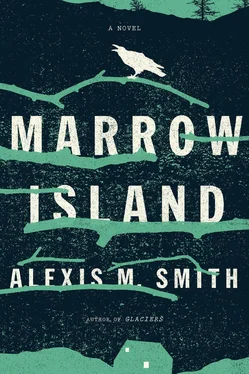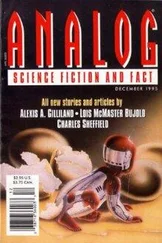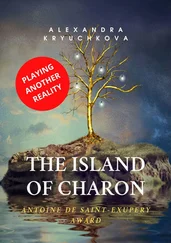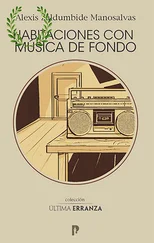We were coming up to the cabin, and I pulled away from her arm.
“What was the incident?” I thought about the pills I had seen in the suitcase, the empty whiskey bottle. “Was he suicidal?”
She paused, calculating.
“No, nothing like that,” she said. “He has helped us over the years, but he has been less and less reliable in the last year, paranoid. He thought his family was after him, then he thought we were after him. We tried to help him, but it’s tricky. It’s always been understood that if something happened to him…” She paused again, choosing her words very carefully. “His family would take over the Trust, and we could lose the Colony.”
“The Swensons own the Colony?”
“Who did you think owned it? The Swensons own the whole island, Luce; they always have. Except for Fort Union — Maura gave that portion to the state back when they made the ArPac deal.”
“Why would Maura have leased the island to ArPac? She was an artist—”
“The Swensons were major shareholders in ArPac. Where did you think their money came from? Maura’s paintings? They had a long-term lease on that land that Julia nullified after the fire. How did you not know this?” She sounded almost angry at me. “You really have been checked out, haven’t you?”
“I haven’t been ‘checked out.’ I’ve been living my life.” I was bewildered at her bitterness.
“After Julia died, the family sent Jacob out here to get him out of the way, keep him busy with the Trust. He has been lying to them for years about the island. They think the land is too polluted to be of use and too much of a liability to sell. They don’t know we’re here.”
“How do you know all this?”
“Because Jacob was like family to us, like Julia was to you. She was devastated by what happened here, and he knew it — the disaster sent her to her grave, Lucie.” Katie’s voice rose a pitch. “Sister knew Julia; she offered her a way to — do penance, or whatever, for the damage, for the loss of life. The deal was already in the works when Julia passed and Jacob took over.”
She looked away from me, fuming. I said nothing.
“She was like a grandmother to you. She took care of you. You didn’t even come back for her funeral.”
“It was only two years after my dad’s funeral; I was fourteen.”
“But you never wondered what’s been going on here all these years?”
“Why are you so angry at me?”
“Because you could have come back any time, Lucie. You could have reached out to me, once.”
“I couldn’t come back.”
“Not even for me?”
“I’m sorry. I was never the brave one.”
“That’s bullshit.” But her voice had softened.
We were stopped, her face lost in the dark. I didn’t know what to say, so I wrapped my arms around her. She stiffened, then relaxed, pulled me in closer. We stood like that for a while, swaying, drunk. Then she took my face in her hands and brought her nose to mine.
“So what’s different now?” she whispered. “Why did you finally come back?”
“I don’t know.” I shook my head, shivered. “You wrote me.”
Katie pulled away.
I closed all of the flimsy curtains around the little sleeping porch, but the gaps were many and wide. I felt the dark watching. I undressed like a girl in a locker room, pulling my bra off under my shirt and out through the sleeve. I climbed into the bed and switched off the metal lamp clipped to the bedstead.
Katie went back to her cottage, to her husband.
I lay there thinking about the island and what I knew about industrial contamination from Superfund sites and oil spills and open pit mines. At old copper mine sites, the leaching fields of arsenic and cadmium and zinc leave water unpotable for miles and for decades, soil so acidic it isn’t good for food or grazing cattle or anything. What can’t be seen is dangerous, the smallest particles of heavy metals in the soil, in the water, for decades, for generations.
Marrow was six square miles. One-third had been burned or chemically polluted to a noxious heap. The rest had been contaminated enough to warrant abandonment.
In my senior year of high school, I was helping my mom clean out the basement. Her new husband had built her a house on Lake Washington; they were moving, and I was going to college. In a box marked for shredding, I found the reports from the lawsuit, the case against ArPac and the settlement they had reached with the families. I had seen the list of toxins that had, in my father’s case, and in their words, “accelerated the immolation so that remains could not be verified, identified, or recovered.” They had fought my father’s death, claiming that the severity of the fire and the near annihilation of the remains they had found meant they could not be certain that “one or more of the missing employees had not been swept away in the tsunami.” Later I would write about another of ArPac’s disasters — an explosion on a platform off the coast of Alaska — noting every name of every one of the same damn chemicals.
Everyone — even the state — had abandoned Marrow. Everyone but Sister J. and Julia Swenson, and Jacob, and all the others who had come and stayed. They had built their homes, their community, here, even when it wasn’t safe to do so. Sister was with the dying woman, Sarah, keeping vigil for her. Sarah was one of the early colonists. She had been here in the early days, drinking the water, going to sleep at night with soil under her fingernails and in her nostrils. She ate food grown here or harvested from this sea. Was she burning to death, but slowly, from the inside?
A knock on the cabin door woke me. I guessed it was 6:30, the sun not quite risen but the sky a creamy blue.
I was following Katie on her work prayer again. She met me outside, a large burlap bag slung over her shoulder. I said, “Good morning,” but she put her finger to her lips and kissed me on the cheek. She looked tired, her eyes sandy and swollen, her hair still mussed from sleep. Sheets of fog clung to the sea like a big unmade bed. We walked through the trees, mist hanging in the air before us. You could open your mouth and eat it.
I had assumed we would be milking again. I almost turned in at the gate, but she took my arm, nodded her head toward the fields. She held my arm fast; she rested her head on my shoulder, the top of her head pressing into my ear. I tried to hear her thoughts, to communicate telepathically, like we used to do sometimes as girls. But she only raised her head and sighed, gazing ahead, and led me on to the field of root crops and greens.
We made our way to the far edge and continued walking slowly along the fence line, Katie scanning the barbed wire and ground. After several yards, she touched my arm. I looked up at her, and she gestured to her feet. A rabbit, neck snared by a trap, hung from a trap in the fence. She pulled a pair of leather work gloves from the sack and put them on. Then she released the trap, looking up at me to make sure I was watching, and pulled the rabbit up by the legs to show me. The rabbit’s head dangled, its eyes and mouth open, rectangular teeth jutting out. She pulled out another sack, handed it to me, gestured for me to hold it open, then dropped the rabbit into it.
I stared into the bottom of the sack. The rabbit’s broken neck folded up, its milky eyes looking somewhere above me. Was this what she was thinking about when she rested her head on my shoulder?
She reset the trap and we walked on.
Not all of the traps were the same, and not all of the rabbits were dead. For the living she had a BB gun, also in the sack. I tried not to look alarmed when she pulled it out. She raised it and aimed squarely between the terrified animal’s ears. I forced myself to watch the life twitch out of them. Katie closed her eyes briefly after each one, looking less pained by the act of killing than I would have expected. How many rabbits had she killed?
Читать дальше












